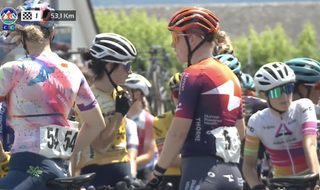'Demands that don't match their level' - Tour des Pyrénées director blames riders over cancellation
Event cancelled by UCI ahead of final stage due to safety concerns

The director of the CIC-Tour Feminin International des Pyrénées has criticised the participating riders after the event was cancelled by the UCI ahead of Sunday’s final stage due to safety concerns.
After Friday’s opening stage was blighted by a series of dangerous incidents, including oncoming traffic on the race route and parked cars blocking roads, the peloton held a protest on stage 2, effectively neutralising the race until the final climb up Hautacam, where Marta Cavalli (FDJ-Suez) took victory and the leader's jersey.
Multiple teams opted to pull out ahead of Sunday’s final stage due to those safety issues, and the UCI later cancelled the remainder of the race following consultation with the organisers, the CPA and the commissaires.
Although the decision to cancel the event was taken by the UCI, race director Pascal Baudron reserved his ire for the riders who had outlined their concerns about the dangers they faced on the opening stage.
“What's happening is that the girls have demands that don't match their level,” Baudron said on Sunday morning, according to La Nouvelle République. “They think they're on the Tour de France and that all the roads have to be closed, that everything has to be locked down. But in France, we can't do that.”
Following the formal cancellation of the race, Baudron continued to focus his criticism on the riders, claiming they were “sawing off the branch they’re sitting on.”
“They’ll be able to cry the day there's no race anymore, and that's what's going to happen,” he said. “Quite honestly, I don't think it's worth organising a race to see all those months of effort ruined for the whims of spoiled children. And I’m thinking of all the volunteers who work so hard. It's catastrophic for morale.”
Speaking to La République des Pyrénées, co-organiser Elisabeth Chevanne-Brachet acknowledged that there had been concerns raised about the opening stage of the race, but she insisted that there had been no issues on stage 2 to Hautacam. This was the second edition of the Tour des Pyrénées, with last year’s inaugural event won by Krista Doebel-Hickok.
“The idea of this race was to give visibility to women’s racing, to provide a mountainous race that doesn’t exist elsewhere on the calendar and to prepare riders for the Tour de France Femmes,” said Chevanne-Brachet, who added that the organisation had unsuccessfully attempted to run the final stage under the aegis of the French Cycling Federation after the UCI’s ruling.
“There are a lot of races stopping. The Tour of Belgium was cancelled, the Women’s Tour was cancelled, the Giro might not happen. If it continues like this, there’ll be no women’s cycling.”
Dangerous opening stage
In a letter to the UCI on Sunday morning, CPA president Adam Hansen noted that 17 of the 24 teams had voiced concern about the safety of the race, with only seven teams in favour of continuing. Hansen added that a poll of team managers had shown nine in favour of complete the race and nine opposed.
“Considering the risks involved, we firmly believe that a bike race is not worth endangering the lives of the female cyclists,” Hansen wrote.
Simone Boilard (St Michel-Mavic-Auber93) described the dangers experienced by the peloton on the opening stage.
“There were oncoming vehicles," she told Radio-Canada. “And when we got to the top of a hill, there was a vehicle parked on the left, so we had to turn right to go around it, but then there was another vehicle parked on the right, so we had to swerve to the left.
“There were also only four in-race motorcyclists, and they got a bit overwhelmed, so they were passing us a bit quickly on narrow roads.”
Boilard expressed a degree of sympathy for the organisers following the cancellation of the race but she stressed that the conditions faced by the riders were not acceptable.
"I have mixed feelings, because I think it's a shame for the organisation, but at the same time, if we continue to tolerate this for too long, it's our safety that's at stake,” Boilard said. “It was one of the worst races I've ever done, but on the other hand, it's true that other races were dangerous too.”
Cofidis directeur sportif Gaël Lebellec described the situation as “delicate,” but expressed hope that it might provide an opportunity to make improvements in the future.
“We’re conscious that we wouldn’t exist without organisers and we’re lucky to have a well-furnished calendar. But when security is judged to be too weak, we can’t make our riders take not inconsiderable risks,” Lebellec told La Nouvelle République.
“It's a sad day for women's cycling, but it's also an important day for the future of the sport, which will be great if all those involved work hand in hand.”

Thank you for reading 5 articles in the past 30 days*
Join now for unlimited access
Enjoy your first month for just £1 / $1 / €1
*Read any 5 articles for free in each 30-day period, this automatically resets
After your trial you will be billed £4.99 $7.99 €5.99 per month, cancel anytime. Or sign up for one year for just £49 $79 €59

Join now for unlimited access
Try your first month for just £1 / $1 / €1
Get The Leadout Newsletter
The latest race content, interviews, features, reviews and expert buying guides, direct to your inbox!

Barry Ryan is Head of Features at Cyclingnews. He has covered professional cycling since 2010, reporting from the Tour de France, Giro d’Italia and events from Argentina to Japan. His writing has appeared in The Independent, Procycling and Cycling Plus. He is the author of The Ascent: Sean Kelly, Stephen Roche and the Rise of Irish Cycling’s Golden Generation, published by Gill Books.